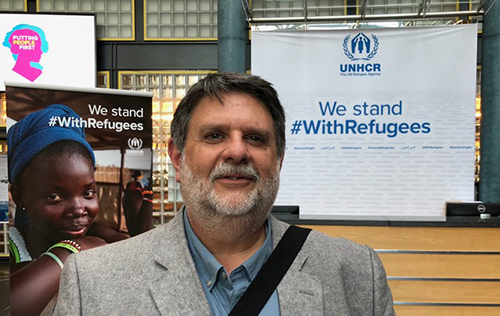
Tim Barnes recently participated at a meeting with the UN High Commissioner for Refugees in Geneva, Switzerland.
BY TIM BARNES
Forced Displacement. Quickly becoming a defining issue in the first quarter of this century, there are now more than 68 million people globally who have been forcibly displaced due to war, conflict and religious and/or political persecution. You may hear them referred to as refugees or asylum seekers.
The equivalent of one-fifth of the population of the United States is fleeing for their lives because their governments are unable to provide safety and protections for them. Despite the rhetoric that we may hear or the pictures we are shown, 52 percent of those fleeing are under the age of 18 and 50 percent are women and girls. A significant number of children, known as unaccompanied minors, are now traveling alone.
This was the state of things that drew me to join International Association for Refugees (IAFR), a Minneapolis based organization with a mission to help people survive and recover from forced displacement. My colleagues and I show up in refugee environments around the world . . . refugee camps in Africa, asylum seeker areas in Europe and in cities and towns in North America where refugees have been resettled. As we show up in these refugee contexts, for us the statistics move from numbers to people . . . human beings with the same desires, dreams and hopes that we have for our children and ourselves. Some that we work with have been displaced for 10, 15, 20-plus years. Solutions are few. The needs are great.
Forced displacement is a global issue impacting in one way or another most of the countries of the world. For that reason, it requires countries and leaders working together to find solutions.
In June, an important gathering sponsored by the office of the United Nations High Commissioner for Refugees (UNHCR) took place in Geneva, Switzerland. I attended this three-day conference along with IAFR’s Founder/President, Tom Albinson who also serves as the Ambassador for Refugees and Stateless People for the World Evangelical Alliance.
The gathering was the 2018 Annual Consultation with Non-Governmental Organizations (NGOs) and UNHCR. In attendance were more than 600 people from 350 organizations from 90 nations focusing on displacement. Also attending were 20 refugees. Aptly enough, the theme was Putting People First.
Throughout the gathering, delegates were reminded that the situation remains dire. Those being displaced are part of the greatest movement of people since World War II. And there is no sign of the trend slowing. As the need for welcoming areas to protect refugees is growing, the space to do so is shrinking . . . especially in the West.
In the opening session, Filippo Grandi, UN High Commissioner for Refugees, said, “Victims of violence are being dehumanized, politicized. Politicians are taking advantage to gain votes. We need to reset the language . . . ” about how we talk of those who have been displaced.
Grandi went on to state clearly, “The majority of the refugee crisis is in Africa, the Middle East and Asia . . . middle to poor countries. There is not a refugee crisis in Europe. There is not a refugee crisis in the United States.” And indeed, according to the UNHCR Global Trends, 85 percent of refugees are hosted in the developing world.
The not-so-subtle elephant in the room during these meetings were the policies and actions of the current U.S. government on the issue of forced displacement. The American government response to those seeking asylum on the U.S. southern border, family separations and the quiet dismantling of the refugee resettlement program were part of the discussions. The former U.S. administration had targeted 110,000 of the most vulnerable individuals for resettlement. The current administration lowered the target to 45,000 in fiscal year 2018. By inaction and policy wrangling, it will be very unlikely it will come even close to that number.
Volker Turk, UN Assistant High Commissioner for Refugees, acknowledged that the impact of globalization has brought a feeling of being disenfranchised to many people, particular in the West. The challenge to civil society, Turk said, is to “address the issues that cause the disenfranchisement, but not to use that to work against the vulnerable. There is a need to move the silent majority to care for the other . . . to move toward compassion and care against indifference.”
Forced displacement is a huge issue with many challenges and obstacles. Yet after these three days of plenary sessions, workshops, discussions and conversations, it is obvious that the effort to find solutions, to help people survive and recover from forced displacement, must continue. Progress will require commitment and work from governments, NGOs, religious organizations and refugees themselves. And yes, also needed are the voices and openness of everyday citizens willing to educate themselves about issues, speak to those of influence and help open humanitarian space in their hearts.
